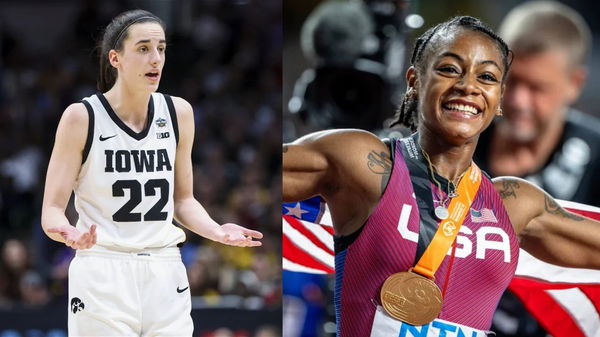
via Imago
Image Credits: Imago

via Imago
Image Credits: Imago
Why Caitlin Clark is not heading to Paris with the 12-player Team USA roster? That is probably the most asked question in the US at the moment. The omission of the No. 1 pick in this year’s WNBA draft has created ripples across several quarters starting from politicians to icons to Shannon Sharpe to whatnot. Meanwhile, quite unexpectedly, track and field also came into the folds of it. Cowboys writer Clarence Hill Jr. linked Clark’s rejection to Sha’Carri Richardson’s ban from the 2021 Olympics in Tokyo. That was the last thing missing in the mix.
Clark has had a fantastic collegiate career where she is the national leader in both points and assists. As a WNBA recruit, she crossed 100 points and 50 assists in her eighth match becoming the fastest rookie to achieve this in WNBA history. If we look at Sha’Carri Richardson’s collegiate career, her time of 10.75s in the 100m race at the 2019 NCAA Division I Outdoor Championships remains unbroken to date. According to Clarence, despite that, there was not enough uproar for Sha’Carri when she was not included in the 2021 Olympic team.
Clarence wrote in his X post, “Sha’Carri Richardson should have been allowed to run in the last Olympics because of popularity and ratings, especially since she was our best sprinter. Did anyone argue that?” But there is a difference between Sha’Carri’s omission and that of Caitlin Clark.
ADVERTISEMENT
Article continues below this ad
Sha’Carri was disqualified from the Tokyo Olympics after failing a drug test for marijuana. She had acknowledged using marijuana to deal with her mother’s passing, but the decision to keep her out of the picture sparked discussions about marijuana laws. USATF was steadfast in its decision not to include Richardson citing the tough anti-doping regulations.
Sha’Carri Richardson should have been allowed to run in the last Olympics because of popularity and ratings, especially since she was our best sprinter.
Did anyone argue that?
— Clarence Hill Jr (@clarencehilljr) June 10, 2024
Despite public sympathy and her heartfelt explanations, the USATF had noted on that occasion, “All U.S.A.T.F. athletes are equally aware of and must adhere to the current anti-doping code, and our credibility as the national governing body would be lost if rules were only enforced under certain circumstances.”
Despite sympathizing with Richardson, the organization refused to digress from the view that all competitors should be held to equivalent standards. “So while our heartfelt understanding lies with Sha’Carri, we must also maintain fairness for all of the athletes who attempted to realize their dreams by securing a place on the U.S. Olympic Track & Field Team.” it had added.
But Caitlin Clark’s miss is not for any controversy that makes her unfit for consideration. Rather, as USA Basketball had pointed out, it was more of a technical decision. Selection committee chair Jen Rizzotti said in a statement, “…When you base your decision on criteria, there were other players that were harder to cut because they checked a lot more boxes.” Considering this, the comparison instantly agitated the enthusiasts who summarily rejected Clarence’s thought.
Fans slam lack of knowledge about track and field
One admirer outlined the remarkable difference between the selection track and field and basketball. In track and field timing in the races has the last word. It is more measurable and justified. Whereas in basketball, it is more on consideration by some individuals.
The user wrote, “I’m not advocating for CC to be on the Olympic team, but this is a terrible comparison. Besides being deemed ineligible, there is no human element in selection for track. That’s why I love it. The time is the time. You qualify, you go. Period.”
ADVERTISEMENT
Article continues below this ad
The official roster for the American women’s squad was revealed by USA Basketball on Tuesday. With a stellar roster of All-Stars, this group hopes to carry on their illustrious history of winning gold at every Olympics since 1996. Caitlin Clark and her mate Aliyah Boston, the WNBA Rookie of the Year the previous season, were noticeable absences from the squad despite their outstanding skill sets. According to those with knowledge of the talks, Clark might be considered a backup if any of the 12 main competitors cannot participate.
One supporter boldly tweeted, “Leave Sha’Carri out of this. Don’t add her into the mess that is the governing body for Team USA. The WNBA has a problem w/ Caitlin Clark, as well as many of the Rookies currently in the League and it shows.”
Whereas this decision leaves ample room for discussion, in contrast, Richardson’s disqualification was a legally more sound choice. One admirer expressed the same view, rejecting the similarity with conciseness: “Lol! This is not even remotely close. Come on!!” These responses highlight how frustrating it is to compare track’s merit-based system to team sports’ controversial selection processes.
ADVERTISEMENT
Article continues below this ad
To provide further context to Richardson’s circumstances, a fan wrote, “She was DQ’d. It wasn’t the US Olympic Team’s choice to leave her out.” This once again emphasized the fact that track and field assessments are made using rigid, predetermined standards rather than judgment. The discussion has also come under fire for propagating false information about the sport.
An informed spectator noted, “Very bad take displaying the lack of knowledge about Track and Field,” stressing the importance of having educated conversations when comparing various sports. For the time being, the discussion becomes an echo of the challenges associated with choosing the Olympic squad and the intense emotions they arouse among spectators.
ADVERTISEMENT
ADVERTISEMENT
ADVERTISEMENT
ADVERTISEMENT

